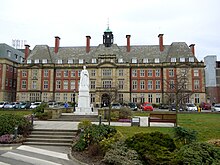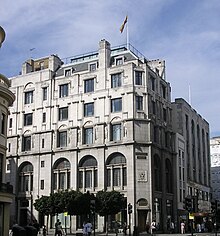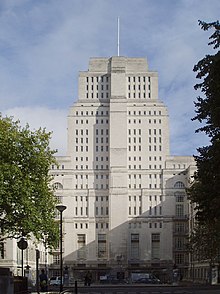| Building | Location[note 2] | Year
completed | Listed | Note |
|---|
| 14–15 Old Bond Street | Westminster | 1911 | – | |
| 55 Broadway | Westminster | 1929 | Grade I[9] | First cruciform plan office building in Britain; includes St James's Park tube station. Sculptures commissioned by Holden for the building include Jacob Epstein's Day and Night and Henry Moore's first public commission. |
| 87 Harmer Green Lane | Welwyn, Hertfordshire | 1906 | – | Holden's own home |
| 127 & 129 High Holborn | Holborn | 1904 | Grade II[10] | |
| Acton Town Underground station | Acton | 1932 | Grade II[11] | |
| Almshouses | Woburn, Bedfordshire | 1906 | – | |
| Alperton Underground station | Alperton | 1931 | – | |
| Archway Underground station | Archway | 1931 | – | Replacement Portland stone and glazed screen entrance façade, since demolished |
| Arnos Grove Underground station | Arnos Grove | 1932 | Grade II*[12] | |
| Balham Underground station | Balham | 1926 | Grade II[13] | |
| Bedfordshire Cottages, Workhouse site | Woburn, Bedfordshire | 1901 | – | |
| Belgrave Hospital for Children | Kennington | 1903 | Grade II*[14] | |
| Birchmoor Lodge | Woburn, Bedfordshire | 1901 | – | |
| Bond Street Underground station | West End | 1927 | – | Replacement Portland stone and glazed screen entrance façade, since demolished |
| Boston Manor Underground station | Boston Manor | 1934 | Grade II[15] | With Stanley Heaps |
| Bounds Green Underground station | Bounds Green | 1932 | Grade II[16] | With Charles Holloway James |
| Bristol Central Library | Bristol | 1906 | Grade I[17] | A Tudor revival exterior with classical interior. Furnishings also by Holden. |
| Bristol Royal Infirmary King Edward VII memorial extension | Bristol | 1912 | – | |
| British Medical Association | Strand | 1908 | Grade II*[18] | Now Zimbabwe House. Jacob Epstein's series of sculptures caused great controversy when unveiled. They were defaced in the 1930s to prevent pieces falling off. |
| British Seamen's Hospital | Istanbul, Turkey | 1903 | – | |
| Bushey Heath Underground station | Bushey, Hertfordshire | – | – | Unbuilt |
| Cavendish Laboratory, Austin Wing, University of Cambridge | Cambridge, Cambridgeshire | 1940 | – | |
| Chiswick Park Underground station | Chiswick | 1932 | Grade II[19] | |
| Clapham Common Underground station | Clapham | 1924 | Grade II[20] | |
| Clapham South Underground station | Clapham | 1926 | Grade II[21] | |
| Clifton College Memorial Arch | Bristol | 1922 | Grade II[22] | |
| Colliers Wood Underground station | Colliers Wood | 1926 | Grade II[23] | |
| Cockfosters Underground station | Cockfosters | 1933 | Grade II[24] | |
| Cottages | Port Sunlight, Merseyside | 1898 | – | |
| Cottage Hospital | Woburn, Bedfordshire | 1903 | Grade II[25] | Listed as Henry P. Adams design |
| Crowholt Lodge | Woburn, Bedfordshire | 1914 | – | |
| Danvers Tower, Cheyne Walk | Chelsea | – | – | Unbuilt design for artists' studios |
| Ealing Common Underground station | Ealing | 1931 | Grade II[26] | With Stanley Heaps |
| Eastcote Underground station | Eastcote | 1939 | Grade II[27] | |
| East Finchley Underground station | East Finchley | 1939 | Grade II[28] | With Leonard Holcombe Bucknell |
| Elstree South Underground station | Elstree, Hertfordshire | – | – | Unbuilt |
| Evelyn House, Oxford Street | West End | 1909 | Grade II[29] | |
| Farm Cottages | Mayland, Essex | 1906 | – | |
| Finchley Central Underground station | Finchley | – | – | With Reginald Uren. Unbuilt. |
| Gants Hill Underground station | Gants Hill | 1947 | – | The platform level concourse was modelled after stations on the Moscow Metro |
| General Hospital | Tunbridge Wells, Kent | 1902 | – | |
| Green Park Underground station | Piccadilly | 1932 | – | New Portland stone entrance shelter adjacent to Green Park, since demolished |
| Grey Gables | Bolton, Greater Manchester | 1898 | – | |
| Hall of Remembrance (War Museum) | London | – | – | Unbuilt |
| Hammersmith tube station | Hammersmith | 1931 | – | New Portland stone and glazed screen secondary entrance façade, since demolished |
| Haresfoot | Berkhamsted, Buckinghamshire | 1920 | – | Additions to existing house |
| Highgate Underground station | Highgate | 1939 | – | Partly built and partly disused |
| Holborn Underground station | Holborn | 1933 | – | Replacement Portland stone and glazed screen entrance façade |
| Homeopathic Cottage Hospital | Southport, Lancashire | 1909 | – | Arts and Crafts hospital building with sea view. |
| Hounslow West Underground station | Hounslow | 1931 | Grade II[30] | With Stanley Heaps |
| House | Delamere Forest, Cheshire | 1898 | – | Holden's first project, unknown location |
| House | Holford, Somerset | 1923 | – | |
| House Knight | Bepton Common, Midhurst, West Sussex | 1915 | – | |
| House Mayor | Bicknoller, Somerset | 1928 | – | |
| House Semon | Great Missenden, Buckinghamshire | 1910 | Grade II[31] | Now known as Rignalls |
| House Sixsmith | Adlington, Lancashire | 1907 | Grade II[32] | Now known as Brown Low |
| Institution of Electrical Engineers Interiors, Savoy Place | Westminster | 1911 | – | |
| Isle of Thanet District Hospital | Margate, Kent | 1926 | Grade II[33] | Now part of Queen Elizabeth, the Queen Mother Hospital |
| Isolation Hospital for Infectious Diseases | Ampthill, Bedfordshire | 1903 | – | |
| King Edward VII Sanatorium | Midhurst, West Sussex | 1906 | Grade II*[34] | Chapel separately listed Grade II*[35] |
| Lodge | Woburn, Bedfordshire | 1908 | – | |
| Lodge, Birchmoor Drive | Woburn, Bedfordshire | 1914 | – | |
| Kings College for Women | Kensington | 1916 | Grade II[36] | Wren-influenced design for college for domestic science |
| Sir James Knott Memorial Flats | Tynemouth | 1939 | – | With Tasker & Child |
| Law Society extension | Holborn | 1904 | Grade II*[37] | Listed with main building by Lewis Vulliamy |
| Leicester Square Underground station | West End | 1933 | – | New Portland stone entrance building including public house and sub-surface booking hall and concourse |
| London Underground Acton Works and Offices | Acton | 1932 | – | |
| Manor House Underground station | Manor House | 1932 | – | |
| Mansion House Underground station | City of London | 1930 | – | Replacement Portland stone and glazed screen entrance façade, since demolished |
| Memorial Chapel, New College, Oxford | Oxford, Oxfordshire | – | – | Unbuilt |
| Morden Underground station | Morden | 1926 | – | |
| Mortuary Chapel, Richmond Hospital | Richmond | 1914 | – | |
| National Library of Wales | Aberystwyth, Wales | 1937 | Grade II*[38] | Front range (modified version of earlier design by Sidney Greenslade). Also the Central Hall (completed 1955). |
| Northfields Underground station | Northfields | 1932 | Grade II[39] | |
| Oakwood Underground station | Oakwood | 1932 | Grade II*[40] | With Charles Holloway James. The free-standing station sign is separately listed Grade II[41] |
| Orchestral Association | London | 1912 | – | |
| Osterley Underground station | Osterley | 1934 | Grade II[42] | With Stanley Heaps |
| Piccadilly Circus Underground station | Piccadilly | 1928 | Grade II[43] | Sub-surface booking hall and concourse beneath the roadway of Piccadilly Circus |
| Rayners Lane Underground station | Harrow | 1938 | Grade II[44] | With Reginald Uren |
| Redbridge Underground station | Redbridge | 1947 | Grade II[45] | |
| Royal Northern Hospital | Holloway | 1941 | – | Demolished |
| Royal Victoria Infirmary | Newcastle upon Tyne, Tyne and Wear | 1906 | – | With W. L. Newcombe |
| Royal Westminster Ophthalmic Hospital | Westminster | 1926 | – | |
| St George's Hospital, Hyde Park Corner | Westminster | – | – | Unbuilt |
| St Luke's Hospital | Valletta, Malta | 1939 | – | |
| School of Oriental and African Studies, University of London | Bloomsbury | 1946 | Grade II[46] | |
| Senate House, University of London | Bloomsbury | 1937 | Grade II*[47] | Tallest office building in London from 1937 to 1957. Remnant of a much grander unrealised scheme. |
| Shire Hall extension | Bedford, Bedfordshire | 1910 | Grade II[48] | Listed with main building by Alfred Waterhouse |
| Southgate Underground station | Southgate | 1932 | Grade II*[49] | Station parade and lamp standards also by Holden separately listed Grade II and Grade II*[50][51] |
| South Harrow Underground station | South Harrow | 1935 | – | |
| South Wimbledon Underground station | South Wimbledon | 1926 | Grade II[52] | |
| SS Caldedonia, Interiors | – | 1922 | – | Interior design of principal rooms for Anchor Line ocean liner |
| SS Cameronia, Interiors | – | 1922 | – | Interior design of principal rooms for Anchor Line ocean liner |
| SS Tuscania, Interiors | – | 1922 | – | Interior design of principal rooms for Anchor Line ocean liner |
| Sudbury Hill Underground station | Sudbury | 1931 | Grade II[53] | |
| Sudbury Town Underground station | Sudbury | 1931 | Grade II*[54] | |
| Sutton Valence School | Sutton Valence, Kent | 1914 | Grade II[55] | |
| Sutton Valence School, Chapel | Sutton Valence, Kent | 1928 | – | |
| Tomb of Oscar Wilde, Père Lachaise Cemetery | Paris, France | 1912 | – | With Jacob Epstein |
| Tooting Bec Underground station | Tooting | 1926 | Grade II[56] | |
| Tooting Broadway Underground station | Tooting | 1926 | Grade II[57] | |
| Torbay Hospital | Torbay, Devon | 1927 | – | |
| Torbay Hospital Chapel | Torbay, Devon | 1929 | Grade II[58] | |
| Trent Park House | Enfield | 1926 | Grade II[59] | New façades to existing mansion |
| Turnpike Lane Underground station | Harringay | 1932 | Grade II[60] | |
| Two Cottages | Oakley, Bedfordshire | 1905 | – | |
| Two Cottages | Woburn, Bedfordshire | 1907 | – | |
| Uxbridge Underground station | Uxbridge | 1938 | Grade II[61] | With Leonard Holcombe Bucknell |
| Victoria Hospital | Folkestone, Kent | 1910 | – | Ward extensions |
| Wanstead Underground station | Wanstead | 1947 | – | |
| Warren Street Underground station | Euston | 1933 | – | Replacement station building |
| West Ham Hospital | West Ham | 1907 | – | |
| West Kensington Underground station | West Kensington | 1928 | – | New façade and ticket hall |
| Westminster Female Refuge | Westminster | 1902 | – | |
| Westminster Hospital, Clapham Common | Clapham | – | – | Unbuilt |
| Westminster Underground station | Westminster | 1924 | – | Replacement side entrance and ticket hall, since demolished |
| Women's Hospital, Soho Square | Soho | 1908 | Grade II[62] | New façades and internal redesign of two existing houses |
| Woodcote | Aspley Guise, Bedfordshire | 1914 | – | |
| Wood Green Underground station | Wood Green | 1932 | Grade II[63] | |

















